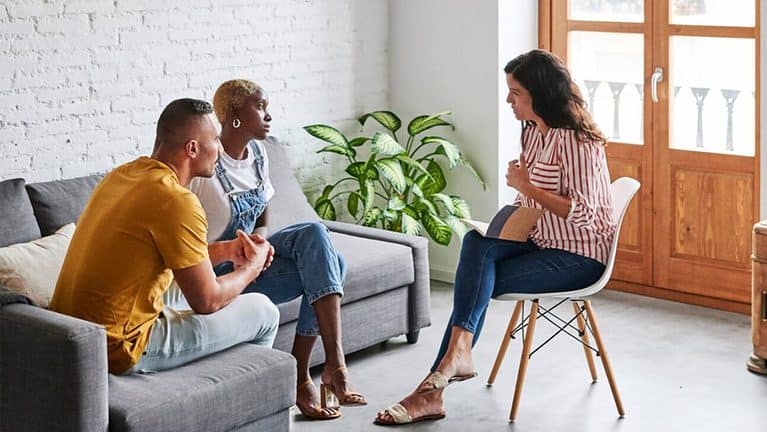Stepping into couples counseling can feel like embarking on an uncharted journey—exciting yet a little daunting. Whether you’re seeking to rekindle the spark, navigate through rough patches, or simply enhance your connection, understanding what lies ahead can make all the difference. In this blog post, we’ll demystify the process of your first couples counselling session. From setting intentions and exploring communication styles to engaging in transformative exercises, we’ll guide you through each step with insights and tips that will help ease any apprehensions. So grab your partner’s hand and get ready to take that leap; it’s time to invest in the love you cherish!
Introduction to Couples Counselling
Couples counselling can feel like a big step, but it’s one that many couples find invaluable. Whether you’re facing communication barriers, trust issues, or just want to strengthen your bond, seeking professional help is a proactive choice. Your first session may bring up a mix of emotions—anxiety, hope, or even curiosity about what lies ahead. Understanding what to expect can ease some of those nerves and make the experience more productive for both partners. Let’s dive into how you can prepare for this journey together and discover the transformative potential of couples counselling.
Understanding the Purpose of Your First Session
Your first couples counselling session serves as a crucial stepping stone toward understanding your relationship dynamics. It allows both partners to express their feelings, concerns, and hopes in a safe space.
During this initial meeting, the therapist will gather insights about your relationship history. You’ll discuss what led you to seek help and identify specific challenges you’re facing.
This session is not just about airing grievances; it’s also an opportunity for discovery. Both partners can share their perspectives without fear of judgment or hostility.
The goal is to establish trust with the therapist while setting the foundation for future sessions. You might find that simply articulating your thoughts brings clarity and opens up new avenues for communication.
Expect to leave feeling heard, validated, and equipped with a better understanding of each other’s emotional landscape. This awareness paves the way for effective collaboration in addressing deeper issues ahead.
Preparing for Your First Session
Preparing for your first couples counselling session can feel daunting. However, taking a few steps ahead of time can ease those nerves.
Start by reflecting on the issues you want to discuss. Jotting down specific examples helps clarify your thoughts and feelings. This preparation gives both partners a chance to express their concerns openly.
Consider setting aside time for each person to share their perspective during the session. This ensures that both voices are heard equally and fosters an environment of respect and understanding.
It’s also beneficial to approach the session with an open mind. You may encounter unexpected emotions or insights about yourself or your relationship.
Lastly, ensure you’re both committed to attending without distractions. Turning off phones or leaving worries at the door allows you to focus solely on resolving conflicts together in a supportive space.
The Role of the Therapist in Couples Counselling
The therapist acts as a neutral guide in couples counselling. They create a safe space for both partners to share their thoughts and feelings without judgment.
Their role is to facilitate communication. This involves helping each partner express themselves clearly while ensuring that active listening occurs. A skilled therapist helps de-escalate conflicts, steering conversations away from blame and towards understanding.
Moreover, they introduce tools and techniques tailored to the couple’s unique dynamics. These strategies can enhance emotional connection and foster healthier interactions.
Ultimately, the therapist empowers couples to navigate challenges together. Their objective is not just resolution but also growth within the relationship itself. By providing insights into patterns of behavior, therapists equip partners with knowledge that encourages lasting change.
Common Issues Addressed in Couples Counselling
Couples counselling often dives into a variety of common issues that partners face. One prevalent concern is communication breakdown. Many couples struggle to express their feelings effectively, leading to misunderstandings and frustration.
Another frequent topic involves trust issues. Infidelity or past betrayals can leave deep scars, making it hard for partners to rebuild their connection.
Conflict resolution techniques are also explored during sessions. Couples may find themselves in endless cycles of arguments without knowing how to break free from them.
Additionally, intimacy challenges arise in many relationships. This can range from emotional disconnection to physical intimacy concerns that need addressing.
Life transitions—like becoming parents or relocating—can create stress within a relationship as well. Counselling provides a supportive space for navigating these changes together.
Each couple’s journey is unique, but these common themes allow therapists to guide partners toward healthier dynamics and deeper understanding.
Communication Techniques Taught in Couples Counselling
Couples counselling emphasizes the importance of effective communication. One key technique is active listening. This involves truly hearing what your partner says without planning your response while they speak.
Another vital skill is using “I” statements instead of “you” statements. For example, saying “I feel unheard when you interrupt me” can prevent defensiveness and promote understanding.
Counsellors also teach partners to express their feelings openly. Sharing vulnerability fosters intimacy and trust in the relationship.
Non-verbal communication plays a crucial role as well. Body language, tone of voice, and eye contact can convey messages just as much as words do.
Practicing these techniques during sessions helps couples build a healthier dialogue at home. With time, partners learn to navigate conflicts more constructively and empathetically, creating a stronger connection between them.
Potential Challenges and How to Overcome Them
Entering couples counselling can feel daunting. It’s common to face challenges that may disrupt the flow of your sessions. One significant hurdle is resistance. Often, one partner might be reluctant to open up or engage fully in discussions.
To overcome this, establish an environment of trust and empathy. Encourage each other to share feelings without fear of judgment.
Another challenge is miscommunication about goals. Partners may have different expectations for what they hope to achieve from counselling.
Be transparent with each other and discuss your individual hopes before diving into deeper topics during sessions. This ensures everyone is on the same page.
Emotions can run high too, making it hard to stay civil during disagreements. Techniques like active listening and taking breaks if tensions rise can help keep conversations productive and respectful.
Remember, facing these challenges together ultimately strengthens your bond when approached with mutual respect and openness.
Setting Goals for Future Sessions
Setting goals for future sessions is a crucial step in the couples counselling process. It provides direction and purpose for both partners as they navigate their relationship challenges.
During your first session, your therapist may encourage you to discuss what you hope to achieve. Are you looking to improve communication? Or perhaps you’re aiming to resolve specific conflicts?
These objectives can help frame discussions in subsequent meetings. They also allow both partners to stay accountable and focused on progress.
As time goes on, it’s essential to revisit these goals regularly. This ensures that the couple remains aligned and can adjust their targets based on evolving needs or circumstances.
The act of setting clear intentions fosters collaboration between partners, enhancing the therapeutic experience. With each session, revisiting these goals strengthens commitment and encourages growth within the relationship.
The Importance of Follow-Up and Consistency
Follow-up and consistency are vital in couples counselling. Regular sessions help maintain momentum in addressing issues. They provide a space for ongoing dialogue, where partners can express feelings and concerns.
It’s essential to keep the lines of communication open between appointments. This practice reinforces what is learned during sessions and fosters emotional connections outside the therapy room.
Couples often find that repetition solidifies new skills. Consistent attendance allows both partners to grow together at a steady pace. It builds trust in the process and ensures that progress is not lost over time.
Additionally, follow-up sessions allow therapists to gauge improvements or setbacks. This awareness helps tailor future strategies specifically for each couple’s unique dynamic, enhancing their journey toward healthier relationships.
The commitment to regular counselling ultimately reflects a shared dedication to growth and understanding within the partnership.
Conclusion: The Benefits of Couples Counselling
Couples counselling offers numerous benefits for partners looking to improve their relationship. It provides a safe space where both individuals can express their feelings and concerns without fear of judgment. This open dialogue fosters understanding, empathy, and connection.
Through the guidance of a trained therapist, couples learn valuable communication techniques that enhance how they interact with one another. These skills not only help in resolving conflicts but also strengthen bonds over time.
Additionally, therapy encourages goal-setting, enabling couples to work collaboratively towards shared aspirations. The consistent support from a professional helps maintain accountability and motivation throughout this journey.
Ultimately, engaging in couples counselling can lead to increased intimacy and satisfaction within the relationship. It’s an investment in each other’s happiness and growth as partners. Embracing this process opens doors to healing and deeper love between you both.






